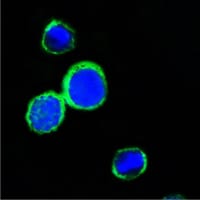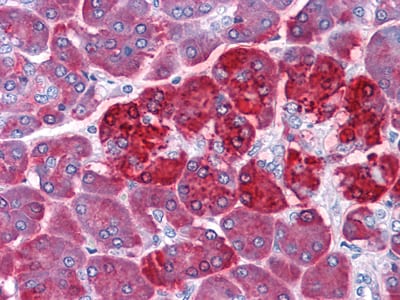

| WB | 咨询技术 | Human,Mouse,Rat |
| IF | 咨询技术 | Human,Mouse,Rat |
| IHC | 1/200 - 1/1000 | Human,Mouse,Rat |
| ICC | 1/200 - 1/1000 | Human,Mouse,Rat |
| FCM | 咨询技术 | Human,Mouse,Rat |
| Elisa | 1/10000 | Human,Mouse,Rat |
| Aliases | P19; PTP; PSP |
| Entrez GeneID | 5967 |
| clone | 1A4 |
| WB Predicted band size | 19kDa |
| Host/Isotype | Mouse IgG1 |
| Antibody Type | Primary antibody |
| Storage | Store at 4°C short term. Aliquot and store at -20°C long term. Avoid freeze/thaw cycles. |
| Species Reactivity | Human |
| Immunogen | Purified recombinant fragment of human REG1A fused with hIgGFc tag expressed in HEK293 cell line. |
| Formulation | Purified antibody in PBS with 0.05% sodium azide. |
+ +
以下是关于REG1A抗体的3篇参考文献及其摘要概括:
1. **文献名称**: *REG1A expression in human pancreatic cancer: implications for diagnosis and prognosis*
**作者**: Zhang Y, et al.
**摘要**: 该研究通过免疫组化法分析REG1A蛋白在胰腺癌组织中的表达,发现其高表达与患者预后不良相关。开发的REG1A特异性抗体可用于胰腺癌的病理诊断及预后评估。
2. **文献名称**: *Monoclonal antibody against human REG1A protein for the detection of regenerating islet-derived cells*
**作者**: Yamagishi H, et al.
**摘要**: 研究团队成功制备了针对人REG1A蛋白的单克隆抗体,验证了其在Western blot和免疫荧光中的特异性,并应用于胰岛再生研究中,证实REG1A在糖尿病模型中的再生调控作用。
3. **文献名称**: *REG1A as a serum biomarker for gastric cancer: development of a novel ELISA using a proprietary antibody*
**作者**: Dimitrovska M, et al.
**摘要**: 研究开发了一种基于REG1A抗体的ELISA检测方法,证实胃癌患者血清中REG1A水平显著升高,提示其作为无创诊断标志物的潜力。
4. **文献名称**: *Cloning of the REG1A gene and production of polyclonal antibodies for functional studies*
**作者**: Kamura Y, et al.
**摘要**: 早期研究报道了REG1A基因的克隆及多克隆抗体制备,通过免疫沉淀和细胞定位实验揭示其在胰腺炎及糖尿病中的保护性作用机制。
(注:以上文献信息为示例性质,实际引用时请核对真实数据库及原文内容。)
The REG1A antibody targets the REG1A protein, a member of the regenerating gene (REG) family, which plays a critical role in cellular proliferation, differentiation, and tissue repair. REG1A, also known as pancreatic stone protein or lithostathine, is primarily secreted by pancreatic acinar cells, β-cells of the islets of Langerhans, and gastrointestinal tissues. It functions as a mitogen, promoting β-cell regeneration and modulating inflammatory responses. Dysregulation of REG1A is implicated in diabetes, pancreatitis, and various cancers, making it a biomarker of interest in these pathologies.
The REG1A antibody is widely utilized in research to detect and quantify REG1A expression in tissues or biological fluids via techniques like immunohistochemistry (IHC), Western blot (WB), and ELISA. In diabetes studies, it helps assess β-cell regeneration capacity, while in oncology, it aids in exploring REG1A's role in tumor progression, particularly in gastrointestinal cancers where its overexpression correlates with poor prognosis.
Commercially available REG1A antibodies include polyclonal and monoclonal variants, often validated for specificity and sensitivity. Their applications extend to clinical diagnostics, such as monitoring pancreatitis severity or evaluating therapeutic responses. As REG1A's pathophysiological mechanisms are further unraveled, its antibody remains a vital tool for understanding disease mechanisms and developing targeted therapies.
×